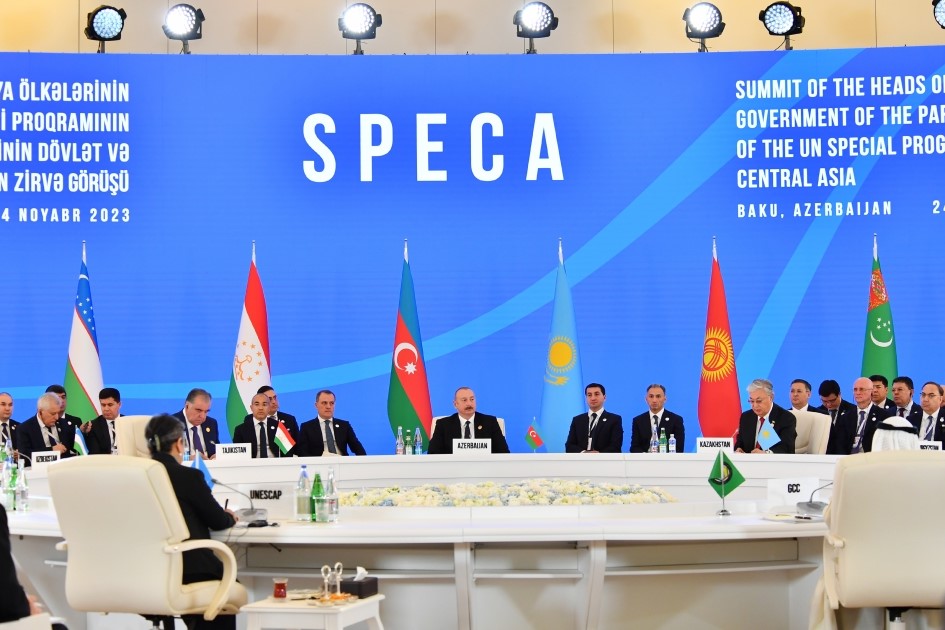
Central Asian, Caucasian and UN leaders meet in Baku. Source: Azar News
President Tokayev attended the UN Special Program for the Economies of Central Asia (SPECA) summit this week in Baku, where the president laid out his country’s plans to further integrate Kazakhstan’s policies into a regional economic framework to improve prosperity and green development. At the meeting, Tokayev cited that Kazakhstan already has 80% of its budget allocated to support the realization of the UN SDG’s goal, but seeks to improve the percentage by optimization of manufacturing processes and the increased use of green energy (Astana Times). Tokayev is further seeking to triple the trade turnover between his country and fellow SPECA member states. The president further called for the creation of green infrastructure corridors to connect member states and to work together to address the degradation of the Aral and Caspian seas (Kazinform). Speaking on bilateral relations with Azerbaijan’s President Aliyev, the two leaders discussed developing cultural and humanitarian ties between the states and the development of a Trans-Caspian transport route (Astana Times).
At the CSTO security forum held in Minsk, Belarus, President Tokayev discussed the global security situation with his head of state counterparts. In particular, the President cited the global instability caused by the Israel-Palestine conflict and called on the need for a ceasefire to prevent further loss of life. He also stated that Kazakhstan has already provided $1 million worth of aid to Gaza, including food, medical, and other emergency assistance (Qazmonitor). Tokayev further called on the international community to support the people of Afghanistan following the recent earthquake in the country and a countrywide famine ravaged the state (Astana Times). In 2024, Kazakhstan will assume the chairmanship of the organization, thus Tokayev laid out some of his priorities for the coming year. This includes signing joint cooperative deals with the United Nations, Shanghai Cooperation Organization and Commonwealth of Independent States organizations. Likewise, Tokayev stressed that the bloc should further develop its security initiatives, ability to combat terrorism and drug interdiction programs to meet growing global challenges (Kazakhstan Newsline).
On the sidelines of the Baku cooperative forum, Kazakh and Uzbek leaders announced their intention to join a ‘green energy corridor’ to provide cheap electricity and fuel supplies from Central Asia to European states (Kun.uz). The Baku decision was preceded by the arrival of a Kazakh delegation in Berlin, Germany to discuss EU investments into the country to develop and improve green energy capacity. As part of the deal with Germany, the EU will front the funds to construct a $50 billion hydrogen complex in western Kazakhstan. At the meeting, further efforts to develop bilateral Kazakh-German ties – especially to increase the volume of trade and industrial investments were also discussed (Astana Times). The interest from Germany and the wider EU to invest in Central Asia’s green energy industries is indicative of the fact that renewable energy is becoming more viable and cost-effective in the region compared to traditional gas and coal sources – this will likely be true regionwide by 2030 (Astana Times).
Kyrgyzstan’s President Japarov announced that his country will begin to experience irreversible water shortages in the coming years due to the melting of the Tien Shan mountain range’s glaciers and the drying up of the region due to climate change (Akipress). Japarov called on regional partners in Central Asia to cooperate to ensure that water-forming glaciers across the region are protected and to further cooperate on more environmentally friendly dams to produce green energy in the region (24.kg). A day after Japarov’s announcement, the country’s Ministry of Natural Resources echoed that it was predicted that glaciers in the region could halve in area by 2050 and disappear by 2100 – though this could occur much faster than predicted (24.kg).
Uzbekistan’s President Mirziyoyev stated this week that Afghanistan plays a “vital role” in the Central and South Asian region’s stability and more must be done to engage Afghanistan’s ruling government to partner in regional stability (Pajhwok). To begin to bridge the gap and foster closer relations with the country, the Uzbekistani president called for the further development of bilateral trade ties and the development of infrastructure projects to connect Afghanistan to the rest of the region (Pajhwok). Alongside the president’s statements, special envoys for Afghanistan from the Organization of Islamic Cooperation met with Uzbekistan's officials in Tashkent to discuss further cooperation and humanitarian aid to mitigate the multiple crises facing the Afghan people – the foremost being the famine currently ravaging the country (Ariana News).

